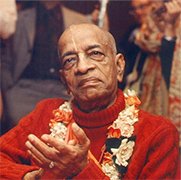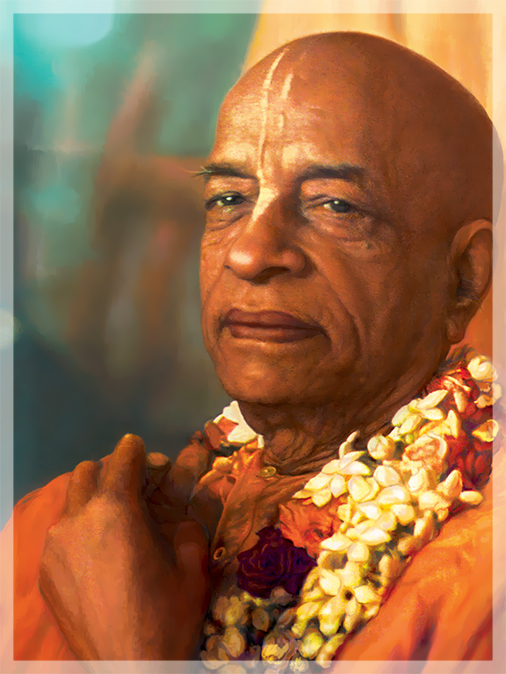 His Divine Grace, A.C. Bhaktivedanta Swami Prabhupada (1896-1977) is widely regarded as the worlds pre-eminent exponent of the teachings and practices of Bhakti-yoga to the Western world. Born Abhay Charan De on September 1, 1896, in Calcutta. From birth, Abhay had been raised in a family devoted to Krishna – the name meaning the all-attactive, all-loving Lord. As a youth he became involved with Mahatma Gandhi’s civil disobedience movement. It was, however, a meeting with a prominent scholar and spiritual leader, Srila Bhaktisiddhanta Sarasvati, which proved most influential on young Abhay’s future calling. Upon their first meeting Srila Bhaktisiddhanta, who represented an ancient tradition of Bhakti (devotional yoga), asked Abhay to bring the teachings of Krishna to the English-speaking world. Deeply moved by Srila Bhaktisiddhanta’s devotion and wisdom, Abhay became his disciple and dedicated himself to carrying out his mentor’s request.
His Divine Grace, A.C. Bhaktivedanta Swami Prabhupada (1896-1977) is widely regarded as the worlds pre-eminent exponent of the teachings and practices of Bhakti-yoga to the Western world. Born Abhay Charan De on September 1, 1896, in Calcutta. From birth, Abhay had been raised in a family devoted to Krishna – the name meaning the all-attactive, all-loving Lord. As a youth he became involved with Mahatma Gandhi’s civil disobedience movement. It was, however, a meeting with a prominent scholar and spiritual leader, Srila Bhaktisiddhanta Sarasvati, which proved most influential on young Abhay’s future calling. Upon their first meeting Srila Bhaktisiddhanta, who represented an ancient tradition of Bhakti (devotional yoga), asked Abhay to bring the teachings of Krishna to the English-speaking world. Deeply moved by Srila Bhaktisiddhanta’s devotion and wisdom, Abhay became his disciple and dedicated himself to carrying out his mentor’s request. In 1950 Srila Prabhupada retired from married life, adopting the vanaprastha (retired) order to devote more time to his studies and writing. He traveled to the holy city of Vrndavana, where he lived in humble circumstances in the historic temple of Radha-Damodara. There he engaged for several years in deep study and writing. He accepted the renounced order of life (sannyasa) in 1959.
At Radha-Damodara, Srila Prabhupada began work on his life’s masterpiece: a multivolume commentated translation of the eighteen-thousand-verse "Srimad-Bhagavatam" ("Bhagavata Purana"). He also wrote "Easy Journey to Other Planets". But it wasn’t until 1965, at the age of seventy, that he would set off on his mission to the West. Having since been awarded the honorary title of Bhaktivedanta in recognition of his learning and devotion, and having taken the vows of sannyasa (renunciation), Abhay Charan, now known as Bhaktivedanta Swami, begged free passage and boarded a cargo ship to New York. The journey proved to be treacherous, and the elderly spiritual teacher suffered two heart attacks aboard ship.
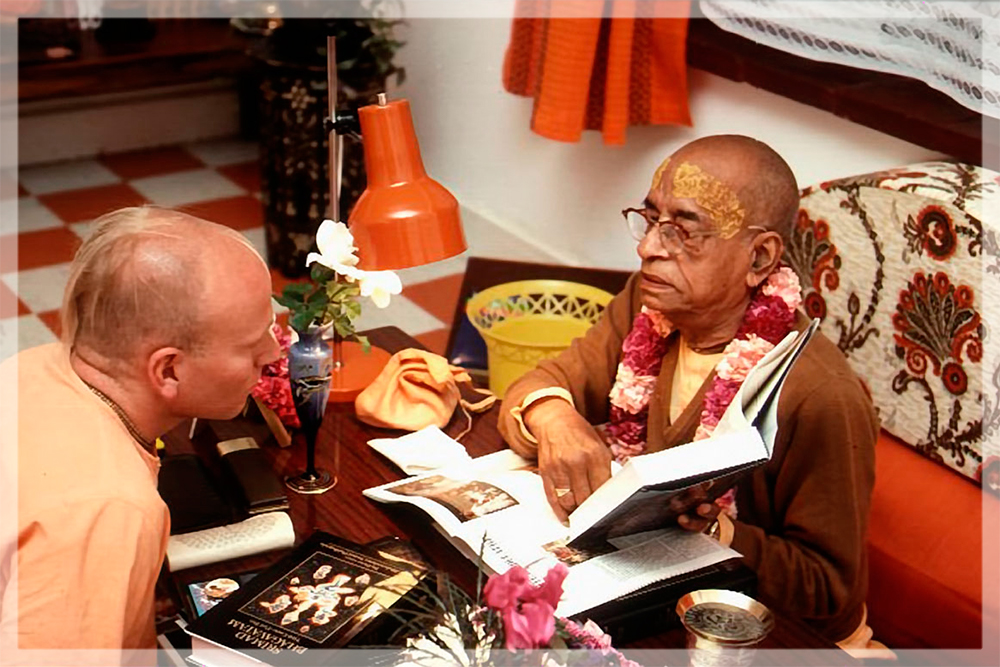 After 35 days at sea he finally arrived at a lonely Brooklyn pier, New York, the USA, with just seven dollars in Indian rupees and a crate of his translations of sacred Sanskrit texts. In New York he faced great hardships without money or a place to live. He began his mission humbly, by giving classes on the Bhagavad-gita in lofts on the Bowery, New York’s infamous skid row, and leading kirtan (traditional devotional chants) in Tompkins Square Park. His message of peace and goodwill resonated with many young people, some of whom came forward to become serious students of the Krishna-bhakti tradition. With the help of these students, Bhaktivedanta Swami rented a small storefront on New York’s Lower East Side to use as a temple.
After 35 days at sea he finally arrived at a lonely Brooklyn pier, New York, the USA, with just seven dollars in Indian rupees and a crate of his translations of sacred Sanskrit texts. In New York he faced great hardships without money or a place to live. He began his mission humbly, by giving classes on the Bhagavad-gita in lofts on the Bowery, New York’s infamous skid row, and leading kirtan (traditional devotional chants) in Tompkins Square Park. His message of peace and goodwill resonated with many young people, some of whom came forward to become serious students of the Krishna-bhakti tradition. With the help of these students, Bhaktivedanta Swami rented a small storefront on New York’s Lower East Side to use as a temple. 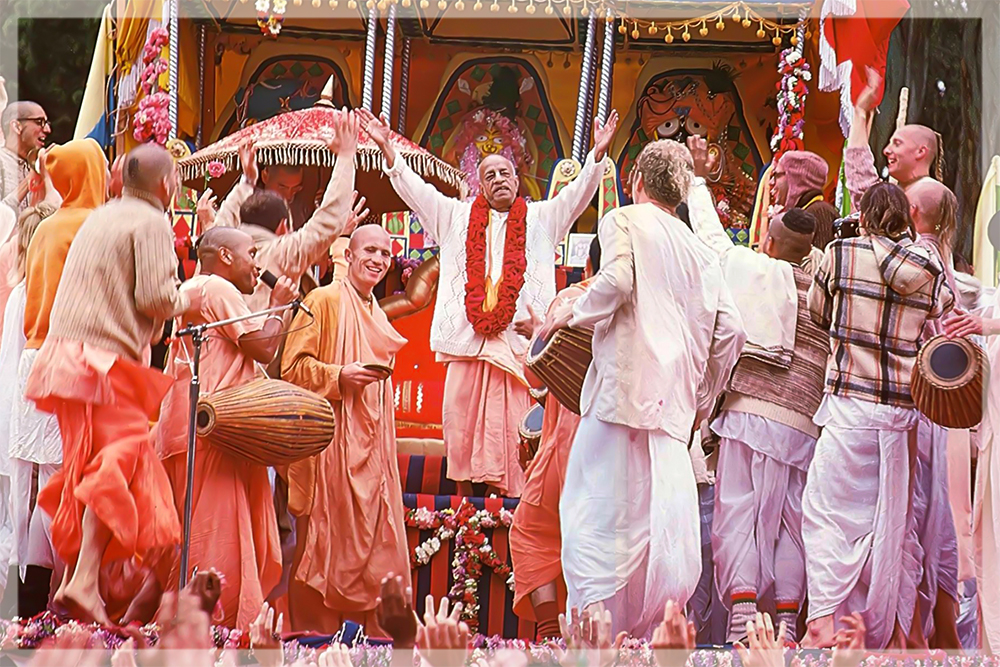 After months of hardship and struggle, in July of 1966, Bhaktivedanta Swami established the International Society for Krishna Consciousness for the purpose of "checking the imbalance of values in the world and working for real unity and peace". He taught that each soul is part and parcel of the quality of God and that one could find true happiness through living a simpler, more natural way of life and dedicating one’s energy in the service of God and all living beings. Having begun initiating his American followers into the Gaudiya Vaishnava lineage, Bhaktivedanta Swami next traveled to San Francisco. Amidst the emerging hippie community in the Haight-Ashbury district, during 1967’s “Summer of Love” he taught that the experience of devotion through kirtan was a spiritual “high” superior to any pleasures derived from material sources such as wealth, fame, or intoxication. In the following months many more came forward to assist him. Desiring to address him with the respect due a revered spiritual teacher, his disciples began to call him Srila Prabhupada, meaning “one at whose feet the masters sit”.
After months of hardship and struggle, in July of 1966, Bhaktivedanta Swami established the International Society for Krishna Consciousness for the purpose of "checking the imbalance of values in the world and working for real unity and peace". He taught that each soul is part and parcel of the quality of God and that one could find true happiness through living a simpler, more natural way of life and dedicating one’s energy in the service of God and all living beings. Having begun initiating his American followers into the Gaudiya Vaishnava lineage, Bhaktivedanta Swami next traveled to San Francisco. Amidst the emerging hippie community in the Haight-Ashbury district, during 1967’s “Summer of Love” he taught that the experience of devotion through kirtan was a spiritual “high” superior to any pleasures derived from material sources such as wealth, fame, or intoxication. In the following months many more came forward to assist him. Desiring to address him with the respect due a revered spiritual teacher, his disciples began to call him Srila Prabhupada, meaning “one at whose feet the masters sit”. 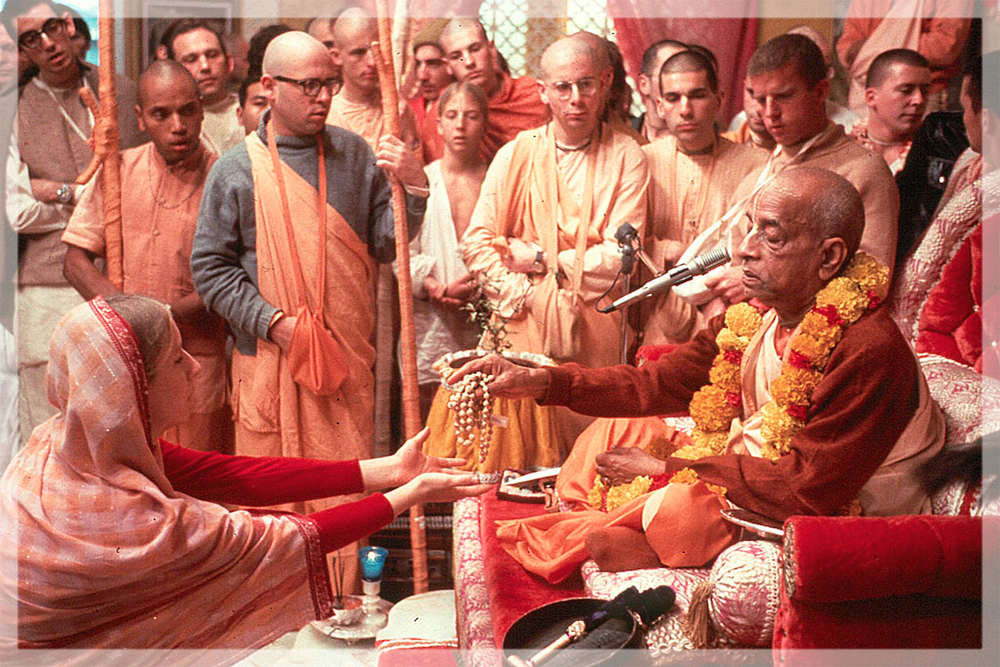 In the twelve years that followed, Srila Prabhupada circled the globe fourteen times, bringing the teachings of Bhakti to thousands of people on six continents. Men and women from all backgrounds came forward to accept his message. With their help, Srila Prabhupada established centers and projects throughout the world including temples, rural communities, educational institutions, and what would become the world’s largest vegetarian food relief program ("Food for Life"). In 1972 His Divine Grace introduced the Vedic system of primary and secondary education in the West by founding the gurukula school in Dallas, Texas. Since then his disciples have established similar schools throughout the United States and the rest of the world. With the desire to nourish the roots of Krishna-bhakti in its home, Srila Prabhupada returned to India several times, where he sparked a revival in the Bhakti tradition.
In the twelve years that followed, Srila Prabhupada circled the globe fourteen times, bringing the teachings of Bhakti to thousands of people on six continents. Men and women from all backgrounds came forward to accept his message. With their help, Srila Prabhupada established centers and projects throughout the world including temples, rural communities, educational institutions, and what would become the world’s largest vegetarian food relief program ("Food for Life"). In 1972 His Divine Grace introduced the Vedic system of primary and secondary education in the West by founding the gurukula school in Dallas, Texas. Since then his disciples have established similar schools throughout the United States and the rest of the world. With the desire to nourish the roots of Krishna-bhakti in its home, Srila Prabhupada returned to India several times, where he sparked a revival in the Bhakti tradition. Srila Prabhupada also inspired the construction of several large international cultural centers in India. The center at Sridhama Mayapur, in West Bengal, is the site for a planned spiritual city, an ambitions project for which construction will extend over many years to come. In Vrndavana are the magnificent Krsna-Balarama Temple and International Guesthouse, gurukula school, and Srila Prabhupada Memorial and Museum. There is also a major cultural and educational center in Mumbai. Other centers are planned in a dozen important locations on the Indian subcontinent.
 Srila Prabhupada’s most significant contribution, however, is his books. He authored over seventy volumes on Bhakti-yoga, which are highly respected for their authority, depth, clarity, and fidelity to tradition. The Bhaktivedanta Book Trust, established in 1972 to publish his works, has thus become the world’s largest publisher of books in the field of Indian religion and philosophy. His writings have been translated into seventy-six languages. His most prominent works include: "Bhagavad-gita As It Is", the thirty-volume "Srimad-Bhagavatam", and the seventeen-volume "Sri Caitanya-caritamrita". For millennia the teachings of Bhakti-yoga had been concealed within Sanskrit and Indian vernacular languages, and the rich culture of Bhakti had been hidden behind the borders of India. Today, millions around the globe express their gratitude to Srila Prabhupada for revealing the timeless wisdom of Bhakti to a world immersed in a materialistic and self-destructive ethos.
Srila Prabhupada’s most significant contribution, however, is his books. He authored over seventy volumes on Bhakti-yoga, which are highly respected for their authority, depth, clarity, and fidelity to tradition. The Bhaktivedanta Book Trust, established in 1972 to publish his works, has thus become the world’s largest publisher of books in the field of Indian religion and philosophy. His writings have been translated into seventy-six languages. His most prominent works include: "Bhagavad-gita As It Is", the thirty-volume "Srimad-Bhagavatam", and the seventeen-volume "Sri Caitanya-caritamrita". For millennia the teachings of Bhakti-yoga had been concealed within Sanskrit and Indian vernacular languages, and the rich culture of Bhakti had been hidden behind the borders of India. Today, millions around the globe express their gratitude to Srila Prabhupada for revealing the timeless wisdom of Bhakti to a world immersed in a materialistic and self-destructive ethos. A. C. Bhaktivedanta Swami Prabhupada passed away on November 14, 1977, in the holy town of Vrindaban, surrounded by his loving disciples who carry on his mission today.
